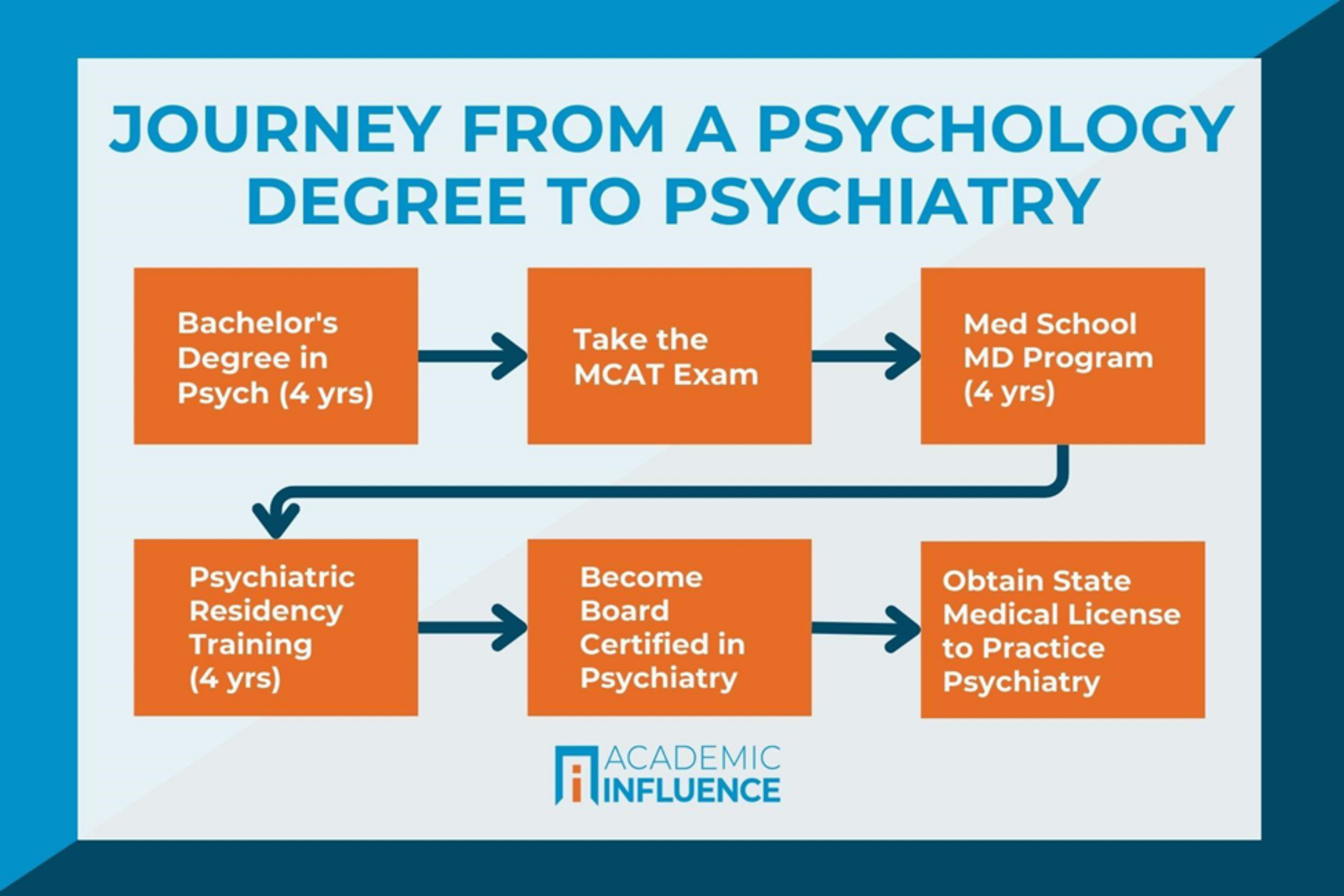How to Become a Psychiatrist with a Psychology Degree

Key Takeaways
- Psychiatrists are medical doctors, who diagnose and treat mental health conditions by managing medications and providing therapy.
- Pursuing a medical degree includes passing the medical licensing examination, securing a medical license, navigating medical school, and completing a residency program.
- It takes 12 years for someone to become a psychiatrist, which includes four years for a bachelor’s degree, four years for medical school, and four years for residency and certification.
Many psychology majors pursue this field because they want to provide therapy and counseling to help people. However, they often wonder if they can become a psychiatrist instead, which also involves medical care and prescription privileges. We’ll walk through the steps required for how to become a psychiatrist with a psychology degree.
Understanding the Role of a Psychiatrist
Psychiatrists, as medical doctors, diagnose and treat mental health conditions. They do this by managing medications, providing therapy, and attending to the special needs of people who are going through a range of emotional and psychological difficulties.
Psychologists conduct research, diagnose and treat emotional and cognitive disorders, and use therapeutic approaches to improve mental health and well-being. They also study human behavior and mental processes. Understanding these key differences is crucial for individuals considering a career in psychiatry.

Real-World Applications
Psychiatrists make a tangible impact through real-world applications. To illustrate the impact of psychiatrists, consider the case study of Sara, a 35-year-old married woman facing severe depression after having a stillbirth.
Sara was experiencing symptoms of grief due to a recent bereavement and was diagnosed with recurring depression. She was paired with an experienced doctor whose goal was to use medication and psychotherapy over the course of 12 weeks.
Witnessing Sara’s transformation over three months highlighted the real-world impact of psychiatric care, showcasing the profession’s ability to effect positive change. The role of a psychiatrist is so much more than a simple medical figure, which newcomers should remember when approaching this fulfilling career.
Back to TopEducational Pathway: From Psychology Degree to Psychiatry
The educational pathway to becoming a psychiatrist, coming from a psychology degree, can be summarized in the following steps:

Once you obtain your state medical license, you can officially find your first job!
A bachelor’s degree in psychology lays a robust foundation for a career in psychiatry. After obtaining a bachelor’s degree, aspiring psychiatrists embark on a transformative journey, pursuing a medical degree. The path includes rigorous training, such as passing the medical licensing examination, securing a medical license, and navigating medical school.
Subsequently, individuals dive into a psychiatry residency program, gaining specialized knowledge. This comprehensive process, overseen by the American Board, ensures psychiatrists are equipped to address complex mental health challenges.
It typically takes 12 years to fulfill the prerequisites to become a psychiatrist, which includes four years for a bachelor’s degree, four years for medical school, and four years for residency and certification. This emphasizes the dedication required for a successful career in psychiatry.
Back to TopNavigating Medical School With a Psychology Background
Aspiring psychiatrists with a psychology background find themselves preparing for the Medical College Admission Test (MCAT), a critical step in gaining admission to medical school. The choice between MD and DO programs depends on personal preferences and career goals.
Medical school equips future psychiatrists with medical knowledge and hone their ability to understand and address mental health issues. After obtaining a psychology degree, this phase is where the transition to the medical field takes shape.
Advice for Aspiring Psychiatrists
Together with medical school, aspiring psychiatrists should integrate practical advice from experts into their education, gain diverse clinical experiences, seek mentorship, and stay informed about evolving psychiatric trends.
Establishing a strong foundation beyond a simple psychology degree lays the groundwork for a successful and fulfilling career in psychiatry.
Back to TopResidency and Specialization
The path advances through psychiatric residency, a pivotal phase where medical doctors transition theoretical knowledge into practical application. In this period, individuals dive into various subspecialties within psychiatry, including addiction, forensic, geriatric, and child and adolescent psychiatry, refining their skills for specific patient populations.
James Barham, PhD, the Vice President at Academic Influence, explains that getting into a psychiatric residency is a key step after completing medical school and earning a medical degree, and it cannot be overstated. It aims to shape licensed psychiatric professionals and ensure that they emerge as specialized and competent practitioners equipped with comprehensive medical licenses.
Barham goes on to share, “When applying to psychiatry residencies, medical school admissions committees look favorably on psychology undergrads who actively engaged in hands-on clinical work and field research rather than just textbook learning. Through clinical work like shadowing licensed counselors or working crisis hotlines, psychology majors can demonstrate an applied understanding of psychiatric conditions, standard interventions, and ethical responsibilities they’ll continue developing in med school and residency.
Likewise, pursuing research opportunities to assist in studies examining mental illness risk factors, diagnostic criteria validation, or treatment efficacy can showcase critical thinking and methodology evaluation abilities that strengthen med school applications.”
Back to TopLicensing and Certification
After completing medical school and residency, the path to becoming a licensed psychiatrist unfolds. State licensing requirements vary. However, they all emphasize the importance of board certification.
Board certification signifies a psychiatrist’s commitment to maintaining high standards in the field. Understanding the intricacies of state licensing and board certification is essential for individuals transitioning from a psychology degree to a psychiatric career.

Back to Top
Career Opportunities and Outlook
With a psychology degree, medical education, and board certification, psychiatrists unlock many career opportunities. Whether in private practice, academia, research, or leadership roles within healthcare institutions, the demand for psychiatric expertise continues to grow.
Exploring diverse career paths is essential to transitioning from a psychology degree to a rewarding career in psychiatry.
Back to TopFuture Trends
Psychiatry is evolving with increased telepsychiatry, personalized treatment approaches, and enhanced collaboration with other healthcare professionals. These changes aim to improve accessibility and effectiveness, shaping a dynamic future for those entering the field.
Frequently Asked Questions
Can I be a psychiatrist without med school?
Attending medical school is essential to becoming a psychiatrist. Medical school training, including passing the Medical College Admission Test (MCAT), is a mandatory step for aspiring psychiatrists.
What’s the fastest way you can become a psychiatrist?
The fastest route to becoming a psychiatrist involves completing a bachelor’s degree, followed by medical school, residency, and obtaining a medical license. Aspiring psychiatrists may also explore fellowship programs for specialized training.
How competitive is psychiatry now?
Psychiatry remains a competitive field. Aspiring psychiatrists should excel in their education, gain relevant clinical experience, and consider pursuing fellowship programs. Continuing education credits are valuable for staying competitive in this evolving field.
The academic route from a psychology degree to becoming a psychiatrist is a transformative odyssey. Aspiring individuals navigate through rigorous med school training, exploring the cosmos of osteopathic medicine and embracing diverse therapeutic modalities such as talk therapy.
Although changing is not without challenges, this career is uniquely fulfilling and worth the extra effort it may require to achieve your passions.